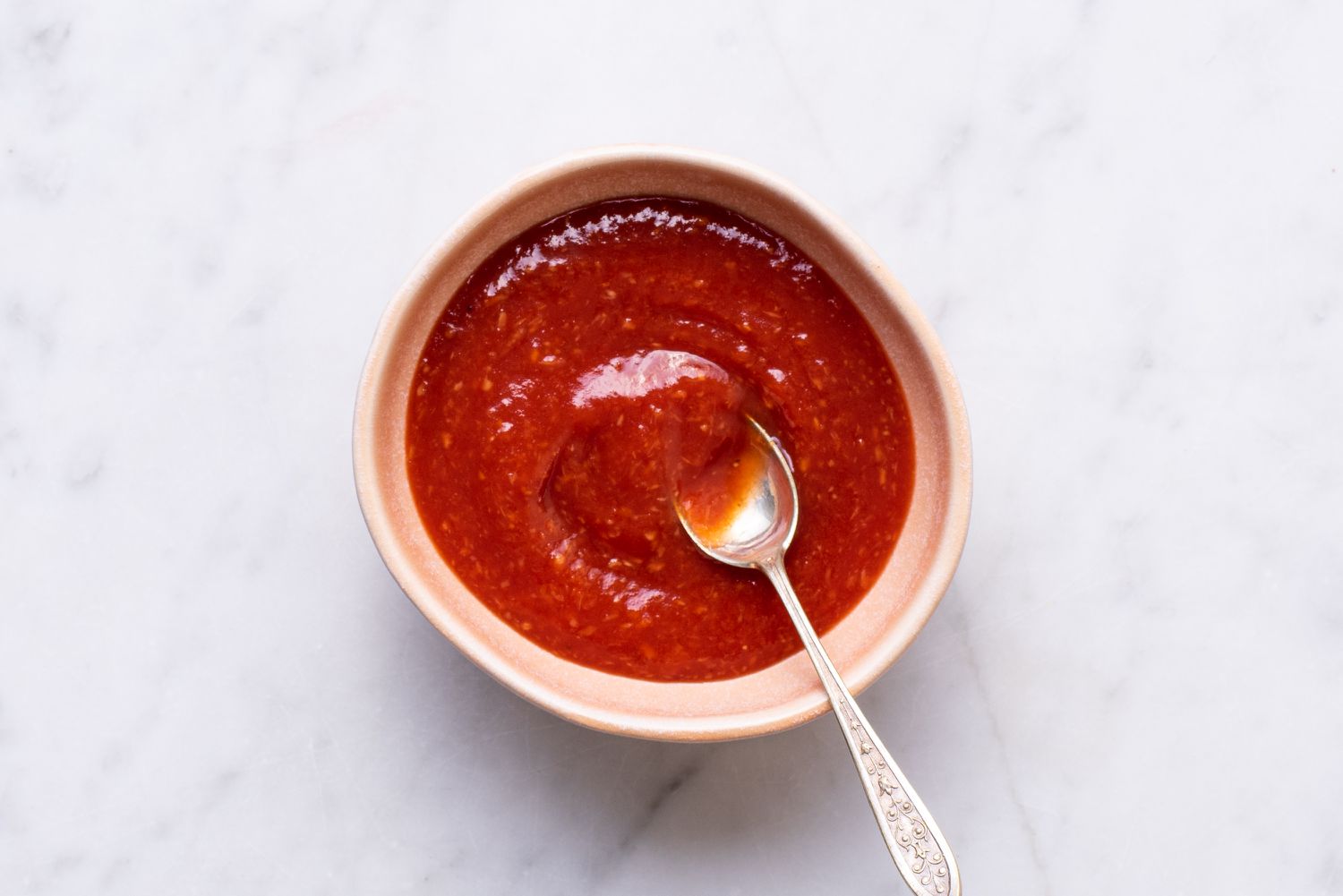Cocktail Sauce Nutrition Facts and Health Benefits

Verywell / Alexandra Shytsman
A staple of dinner parties, buffets, and appetizers in restaurants across the world, cocktail sauce—also known as seafood sauce—whets the appetite and is served as a cold or room temperature condiment. The sauce is generally a dipping side to accompany the star of the appetizer—cold seafood, such as shrimp, oysters, or prawns.
A fat-free, tomato-based condiment, cocktail sauce can get prepared with any number of hot sauces, depending on your preference for heat. Other ingredients include garlic, lemon, and horseradish.
But overall, the sauce contains a high amount of sugar and sodium so it should be consumed in moderation. Here is what you need to know about cocktail sauce.
Cocktail Sauce Nutrition Facts
This nutrition information, for one 1/4 cup serving, or 69 grams, of cocktail sauce, is provided by the USDA.
- Calories: 80
- Fat: 0g
- Sodium: 821mg
- Carbohydrates: 19g
- Fiber: 0.966g
- Sugars: 16g
- Protein: 1g
Carbs
The majority of the 19 grams of carbs from a cocktail sauce serving come from corn syrup, tomato concentrate (or ketchup), and molasses. This nutritional information is for branded cocktail sauce. You could cut the carb count by making your own homemade version, removing the molasses, and using ketchup with a low amount of sugar or even tomato sauce.
Fats
Cocktail sauce is fat free and does not contain any fatty acids, including trans or saturated fat.
Protein
Even though you potentially consume approximately 1 gram of protein per serving, you should not consider this product a good source of protein. You can increase your protein intake through the shellfish dipped in the sauce.
Vitamins and Minerals
Cocktail sauce does contain a very small amount of vitamins and minerals including 20 milligrams of calcium, 0.718 milligrams of iron, 6 milligrams of vitamin C, and 100 IU of vitamin A.
Health Benefits
While cocktail sauce does add a tangy, spicy flavor profile to your food, it is high in sodium and should be consumed in moderation, especially by those with certain medical conditions that require a reduced or low-sodium diet. One serving of cocktail sauce (69 grams) also contains 16 grams of sugar, so it should be consumed in moderation particularly by those with diabetes as well.
That said, cocktail sauce may have minimal health benefits. It contains small amounts of vitamin C, vitamin A, and lycopene. Lycopene is a powerful antioxidant that can help reduce and eliminate free radicals that damage DNA and cell structures, making you less prone to aging stressors. This carotenoid that gives tomatoes its red color may also help prevent cancer, most notably stomach, lung, and prostate cancers.
Overall, cocktail sauce enhances the flavor and palatability of the dishes it is added to like raw shrimp, deviled eggs, fried mushrooms, and omelets. And, its tangy flavor profile may even make you feel more satiated. There is some evidence indicating that when you feel more satiated after eating, you are less likely to feel deprived. This can be particularly helpful for those with weight management goals.
Allergies
It is possible to experience a reaction to spices found in cocktail sauce, which is not a true allergic reaction. Instead, it is known as spice intolerance or oral allergy syndrome. Symptoms of this reaction include a skin rash, itching at the mouth, and coughing.
More prevalent is an allergy to the shellfish that accompanies cocktail sauce. Shellfish is one of the leading causes of food allergies in adults, estimated at 0.5% to 2.5% of the adult population. Symptoms include numbness in the mouth, muscular pain, dizziness, vomiting, nausea, and diarrhea. Shellfish is also one of the main causes of food-related anaphylaxis.
Storage and Food Safety
You can use cocktail sauce up to 18 months past the expiration date as long as you store it safely. In the refrigerator, cocktail sauce that has been opened can last for 6 to 9 months. Just be sure to pour your cocktail sauce into a bowl rather than dipping it into your jar. Dipping your seafood directly into the jar causes it to become contaminated and will decrease its shelf life.
How to Prepare
Cocktail sauce is a combination of a few ingredients—ketchup, horseradish, lemon juice, and hot sauces (most often Worcestershire and tabasco sauce). You can mix the spicy sauces to your preferred heat profile. The most popular ways to serve cocktail sauce are as a dip with a protein like shellfish on the side.
You also can mix it into beverages like Bloody Mary's or drizzle it on burgers or sandwiches for flavor and spice. You can even add it to deviled eggs for extra spice or top your favorite omelet with cocktail sauce.
USDA. Cocktail sauce.
Harvard Health. Vegetables and Fruits.
Story EN, Kopec RE, Schwartz SJ, Harris GK. An update on the health effects of tomato lycopene. Annu Rev Food Sci Technol. 2010;1:10.1146/annurev.food.102308.124120. doi:10.1146/annurev.food.102308.124120
Hetherington MM, Cunningham K, Dye L, Gibson EL, Gregersen NT, Halford JC, Lawton CL, Lluch A, Mela DJ, Van Trijp HC. Potential benefits of satiety to the consumer: scientific considerations. Nutr Res Rev. 2013 Jun;26(1):22-38. doi:10.1017/S0954422413000012 PMID:23680169
American Academy of Allergy, Asthma & Immunology. Can spices cause allergic reactions?
American College of Allergy, Asthma, & Immunology. Food allergy.
:max_bytes(150000):strip_icc()/Jennifer-Purdie-660-860ee4e986fc4052821de676195461b3.jpg)
:max_bytes(150000):strip_icc()/unnamed-38aa6879f8b546c3a3ba36ec48bda560.jpeg)
:max_bytes(150000):strip_icc()/Jennifer-Purdie-660-860ee4e986fc4052821de676195461b3.jpg)
:max_bytes(150000):strip_icc()/duck-sauce-crop-15525a531b11422fa66ca467cada6479.jpg)
:max_bytes(150000):strip_icc()/woscestershire-crop-2-d941b23ba8cb45f69f84febaf7f02cdf.jpg)
:max_bytes(150000):strip_icc()/tartar-sauce-54bacd0fa5d84407a3370b2f9f7dd58e.jpg)
:max_bytes(150000):strip_icc()/aioili-crop-1597071d026a4df0a8edd34d717ea415.jpg)
:max_bytes(150000):strip_icc()/soy-sauce_crop-f0f754fb51d841a6ada46fa1695a646a.jpg)
:max_bytes(150000):strip_icc()/barbecue-sauce-crop-8ecba037719e47119e0b272f6d99cb96.jpg)
:max_bytes(150000):strip_icc()/ketchup-crop-5ca1f24fe450400aace186206d0d7a27.jpg)
:max_bytes(150000):strip_icc()/wonton-crop-7b86f248929f4712a0c20893952f5177.jpg)
:max_bytes(150000):strip_icc()/GettyImages-177746753-b3dc71996812470eba1a323f89cde3ef.jpg)
:max_bytes(150000):strip_icc()/marinara-crop-0342617e75654780812c5e75e0c9bc16.jpg)
:max_bytes(150000):strip_icc()/red-lobster-nutrition-facts-4134720-a760defe0cf641d99b2e9968e3556a5e.jpg)
:max_bytes(150000):strip_icc()/GettyImages-1293605375-56f501d4baec4fbb868a38eb86dd0740.jpg)
:max_bytes(150000):strip_icc()/molasses-crop-493c63b97d294b37845121fdebf8859d.jpg)
:max_bytes(150000):strip_icc()/GettyImages-1323184901-c8f9cfd0d7f5472aa2c9b4f69322a064.jpg)
:max_bytes(150000):strip_icc()/horseradish-crop-fe5665418a5d480384ea3e3f99621c8c.jpg)
:max_bytes(150000):strip_icc()/GettyImages-1263455266-b8c65bead6b646948938237dfb4d2740.jpg)